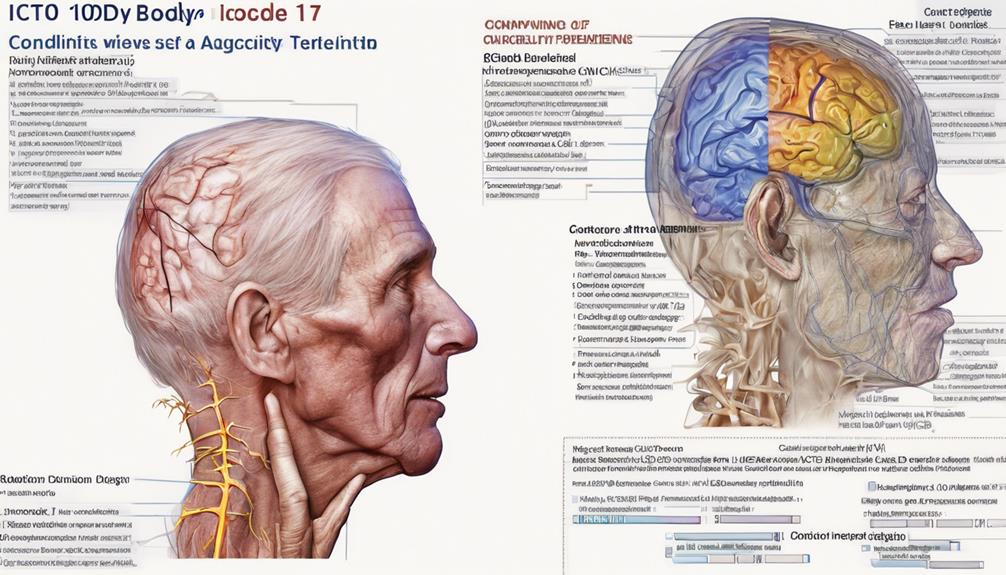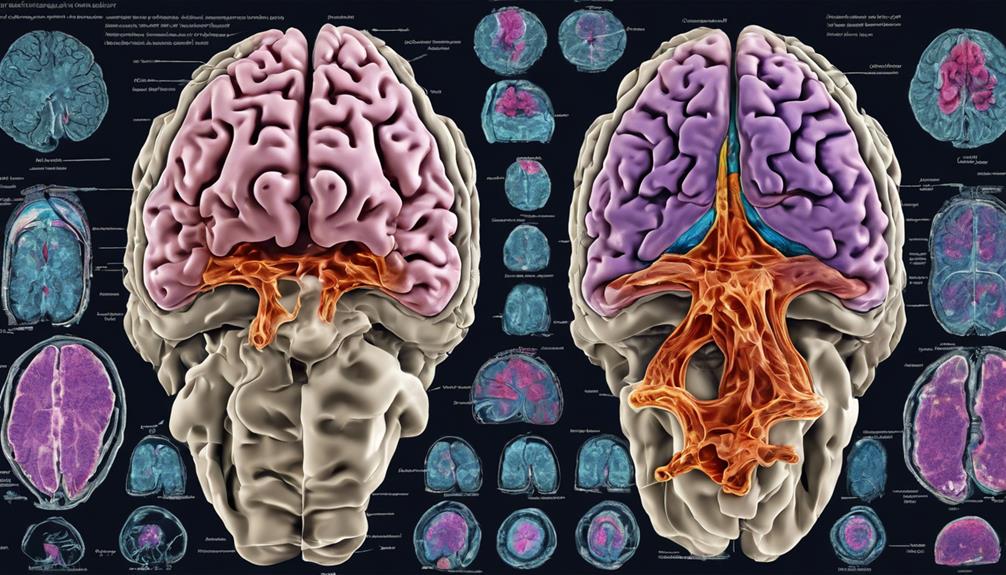Let’s tackle a common issue head-on: medical coding can often seem daunting due to its complexities.
However, understanding ICD-10 Code G31.83 for Lewy body dementia is essential for accurate documentation and appropriate reimbursement.
As we explore the nuances of this specific code, we'll uncover how it impacts diagnosis, treatment decisions, and overall patient care.
Stay tuned to discover the intricate interplay between clinical features and coding guidelines in managing this challenging neurocognitive disorder.
Key Takeaways
- Accurate ICD-10 coding crucial for Lewy Body Dementia diagnosis.
- Proper sequencing of conditions and manifestations for coding.
- Multidisciplinary approach enhances patient care and quality of life.
- Follow official guidelines and seek reputable sources for accurate coding.
Overview of Lewy Body Dementia ICD-10 Code
Understanding the intricacies of the ICD-10 code G31.83 for Lewy body dementia is essential for accurate diagnosis and billing processes. When dealing with Lewy body dementia, proper utilization of the ICD-10-CM code G31.83 is crucial for ensuring billable services and appropriate reimbursement.
This specific code categorizes Lewy body dementia under Diseases of the Nervous System, highlighting its significance in the medical field. To correctly document and code for Lewy body dementia, it's essential to follow the guidelines of sequencing underlying conditions before manifestations. This approach not only aids in accurate diagnosis but also ensures that healthcare providers receive the deserved reimbursement for their services.
Diagnostic Criteria and Code Specificity

For accurate diagnosis and coding of Lewy body dementia, adherence to specific diagnostic criteria and code specificity is paramount. The ICD-10 code G31.83 is crucial in identifying Lewy body dementia cases, enabling effective billing and monitoring disease progression.
When assigning codes for Lewy body dementia, sequencing the underlying physiological condition before the manifestations is essential for precise coding. Utilizing additional codes like F06.7 to indicate mild neurocognitive disorders related to known physiological conditions further enhances coding accuracy.
G31.83 falls under the classification of Neurocognitive Disorder with Lewy Bodies, synonymous with Lewy body dementia or Lewy body disease, emphasizing the importance of proper code assignment.
Accurate coding not only aids in tracking the progression of Lewy body dementia but also supports research efforts and ensures appropriate treatment interventions. Understanding the diagnostic criteria and code specificity is fundamental in providing quality care for individuals with Lewy body dementia.
Clinical Features and ICD-10 Coding
Clinical evaluation reveals distinctive features in individuals with Lewy body dementia, guiding the precise assignment of ICD-10 code G31.83.
- Symptoms: Patients may present with fluctuations in alertness, visual hallucinations, movement impairments, and cognitive decline, distinguishing Lewy body dementia from other neurodegenerative disorders.
- Diagnosis Challenges: Due to overlapping symptoms with Parkinson's and Alzheimer's diseases, diagnosing Lewy body dementia accurately can be complex and requires a thorough evaluation by healthcare professionals.
- ICD-10-CM Coding: Proper sequencing of underlying conditions before manifestations is crucial for accurately documenting Lewy body dementia in medical records and ensuring appropriate coding for billing purposes.
- Treatment Focus: Management of symptoms forms the cornerstone of treatment for Lewy body dementia, as there's currently no cure available for the condition. Multidisciplinary approaches involving medications, therapy, and support services aim to improve quality of life for individuals affected by this challenging disease.
Treatment Approaches and Coding Considerations

In managing Lewy body dementia, treatment approaches and coding considerations play crucial roles in ensuring proper care and billing accuracy within healthcare settings.
Treatment for Lewy body dementia focuses on managing symptoms such as fluctuations in alertness, visual hallucinations, and movement problems. Medications like cholinesterase inhibitors and memantine are commonly used to address cognitive symptoms. Non-pharmacological interventions like physical therapy and occupational therapy can help improve mobility and daily functioning.
Caregiver support and education are essential in managing the complex symptoms and challenges associated with Lewy body dementia.
Proper documentation and accurate coding of Lewy body dementia diagnosis and treatment are crucial for billing and reimbursement in healthcare settings. By utilizing appropriate codes and detailed documentation, healthcare providers can ensure that patients receive the necessary care while also facilitating proper billing processes.
Importance of Accurate ICD-10 Coding
Transitioning from treatment approaches to coding considerations, accurate ICD-10 coding plays a vital role in ensuring proper reimbursement and diagnostic accuracy for patients with Lewy body dementia. When it comes to coding for Lewy body dementia, precision is key to maintaining compliance and providing optimal patient care. Here's why accurate ICD-10 coding is crucial:
- Reimbursement: Accurate coding ensures that healthcare providers are appropriately reimbursed for the services they provide in managing Lewy body dementia cases.
- Diagnostic Accuracy: Properly sequenced ICD-10 codes help in identifying and documenting the specific manifestations of Lewy body dementia, leading to more accurate diagnoses and tailored treatment plans.
- ICD-10-CM Code G31.83: This specific code for Neurocognitive Disorder with Lewy Bodies is essential for accurately capturing the diagnosis in medical records.
- Compliance and Resources: Adhering to official coding guidelines and seeking guidance from reputable sources like the AHA Coding Clinic can assist healthcare professionals in navigating complex coding scenarios related to Lewy body dementia.
Frequently Asked Questions
What Is the ICD-10 Code for Dementia With Lewy Bodies?
We use the ICD-10 code G31.83 for dementia with Lewy bodies. It's crucial to note that this code became effective on October 1, 2023, covering conditions like Lewy body dementia.
When utilizing this code, remember to sequence underlying conditions before manifestations. Sometimes, additional codes are necessary to pinpoint mild neurocognitive disorders due to known physiological conditions.
Accurate coding for neurocognitive disorder with Lewy bodies relies on proper use of the ICD-10 code G31.83.
What Is the Lewy Body Dementia?
Lewy body dementia is a progressive neurodegenerative condition that affects alertness, memory, movement, and can involve hallucinations. Its symptoms worsen over time and typically manifest between ages 50-85.
Treatment focuses on symptom management since there's no cure. Accurate diagnosis is crucial for proper tracking and care.
Proper documentation and coding using ICD-10-CM code G31.83 are essential for identifying and managing Lewy body dementia.
What Is the ICD 9 Code for Lewy Body Dementia?
We no longer use ICD-9 codes for medical coding since October 1, 2015. The current ICD-10 code for Lewy Body Dementia is G31.83, specifically for Neurocognitive Disorder with Lewy Bodies.
This transition from ICD-9 to ICD-10 allows for more detailed classification and coding of health conditions. Accurate documentation and billing for patients with Lewy Body Dementia are ensured through the proper use of the ICD-10 code G31.83.
What Is the ICD-10 Code for G31.82?
We can clarify that the ICD-10 code for G31.82 is 'g32.82.' This code is crucial for accurate diagnosis and billing purposes in healthcare.
When using this code, it's essential to sequence any underlying physiological conditions before their manifestations. Sometimes, additional codes might be necessary to identify mild neurocognitive disorders alongside G31.82.
Correct utilization of this ICD-10 code guarantees precise coding for the specific condition in healthcare settings.
Conclusion
In conclusion, as we navigate the complex landscape of Lewy Body Dementia, the significance of accurate ICD-10 coding can't be overstated.
By ensuring proper documentation and coding specificity, healthcare professionals can effectively diagnose, treat, and manage this challenging condition.
Let's not overlook the critical role that coding plays in providing optimal care for individuals with Lewy body dementia, as we strive for better outcomes and improved quality of life.









